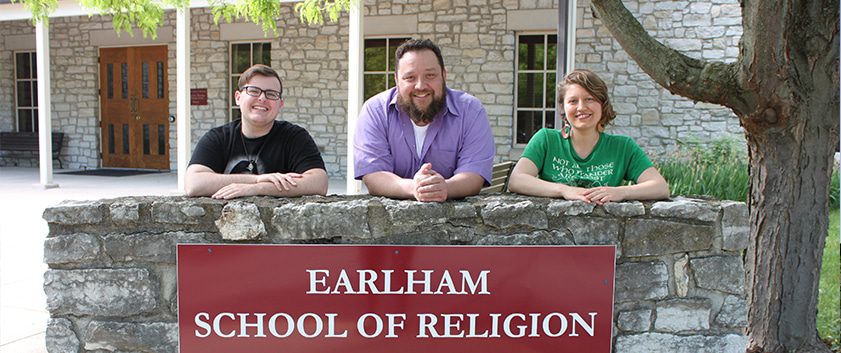Leadership and governance
Governance of the Earlham School of Religion is grounded in the by-laws of the Earlham Board of Trustees, and must remain in conformity with those by-laws.
ESR’s governance document addresses the institution’s mission, programs and degree offerings, and commitment to academic freedom and responsibility.
It defines the appointment, roles, authority and responsibilities of the boards, committees and individuals who oversee the administration and operation of the Earlham School of Religion or are engaged in learning at the institution, including:
- Board of Trustees
- President of Earlham
- Vice President of Earlham and Dean of the Earlham School of Religion
- Faculty + Staff
- Board of Advisors
- Students
- Emeriti Faculty & Staff
In addition, the governance document sets forth the terms of ESR’s partnership with Bethany Seminary.
The current Earlham School of Religion governance document was approved by faculty on February 5, 2001 and by the Board of Trustees on February 17, 2001.

Community governance
Quaker business is conducted in the context of worship. Rather than voting, decisions are based on the leading of the Holy Spirit through the sense of the meeting by those in attendance. A presiding clerk guides the discussion, and is responsible for interpreting the sense of the meeting.
Earlham School of Religion is not a Quaker meeting, but is an institution of higher learning committed to theological education. While not all matters are decided in a meeting for business, our approach to business and decision-making draws deeply upon our Quaker heritage. Faculty, staff, and students participate jointly in shaping learning and community at ESR.
The Faculty Meeting for Business and Student Meeting for Business are responsible for community governance. Committees support the work of these two Meetings for Business. All meetings are held according to Quaker principles. These afford ample opportunities for involvement in the decision-making process of the school for faculty and students.
- Student Committees: Student Meeting for Business oversees student committees that each selects its own clerk, who is then designated to report important committee concerns to the Student Meeting for Business. Student committees include: Nominating Committee; Community Life Committee; Student Pastoral Care Committee; and Spring Banquet Committee.
- ESR Faculty Committees: The Committees of the Faculty are: Admissions Committee; Faculty Review Committee; Field Education Committee; Harassment Committee; and Personnel Committee. Each committee is composed of at least two faculty members and is convened by a clerk, who is selected by the committee. The Harassment and Personnel committees include a student representative selected by the Student Meeting for Business.
- Joint Student-Faculty Committees: Currently there are two joint student-faculty committees, each of which is vital to the formation of community in the school: Common Meal Committee and Worship Committee. Each of these committees has at least one faculty member and two or more student members. Members of the committee determine leadership.
- Partnership Committees: To facilitate smoother integration with its partner seminary, Bethany Theological Seminary, certain joint committees have been formed and function regularly. These are: Joint Academic Planning Committee; Joint Library Committee; Joint Faculty Retreat Committee; and Information Technology Roundtable.
BOARD OF TRUSTEES
Earlham’s Board of Trustees is committed in its ongoing support of Earlham School of Religion.
BOARD OF ADVISORS
Earlham School of Religion’s Board of Advisors assists in steering ESR as we seek to fulfill our mission.
Happening On Campus
Quaker Leadership Conference
Time: 12:00 amREGISTER ON EVENTBRITE All Friends and ESR alums – YOU are invited. Our focus will be on hearing and telling stories that are FOR the future. If you are committed…
The post Quaker Leadership Conference appeared first on Earlham School of Religion.
A Conversation with Anne Lamott
Time: 7:00 pmJoin us for a night of captivating conversation with bestselling novelist and essayist Anne Lamott as ESR’s Ben Brazil interviews her. Register via EventBrite About Anne Lamott Anne Lamott writes…
The post A Conversation with Anne Lamott appeared first on Earlham School of Religion.
ESR Alumni Reunion
Time: 5:00 pmWe hope you can join us for the upcoming ESR Alumni Reunion. We hope to embark on a journey down memory lane, reconnecting with friends, reliving cherished moments, and making…
The post ESR Alumni Reunion appeared first on Earlham School of Religion.
Quaker Trustee Series: Rentals
Time: 1:00 pmWhat does right relationship mean when we have tenants? To whom do we rent, and why? How do we create rental policies? How do we work with tenants that miss…
The post Quaker Trustee Series: Rentals appeared first on Earlham School of Religion.
Quaker Trustee Series: Investments
Time: 1:00 pmWhen it comes to investing money, what are our options? How do we assess possibilities with an eye to financial return, stability, and God’s purposes and leadings?
The post Quaker Trustee Series: Investments appeared first on Earlham School of Religion.